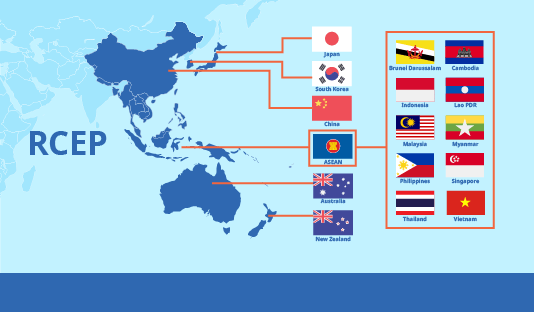The provisions of the RCEP and CPTPP in electronic commerce are similar, according to a report by the World Trade Organization (WTO).
First and foremost, the Regional Comprehensive Economic Partnership is a modern, comprehensive, high-quality, win-win economic partnership promoted by ASEAN among the 10 ASEAN Member States, Australia, China, the Republic of Korea, Japan and New Zealand.
Signed on November 15, 2020, it is the largest Free Trade Agreement (FTA) to date and comprises approximately 30% of the world’s GDP and almost a third of the world’s population.
It builds on existing ASEAN bilateral agreements with FTA countries and establishes a single regulatory code and trade facilitation promotion measures to help companies take advantage of regional value chains.
The Regional Broad Economic Association also covers new areas such as competition policy, intellectual property and public procurement.
RCEP
The investment provisions of this Agreement are broader than those of existing ASEAN FTAs, for example in terms of the prohibition of performance requirements.
Likewise, said Agreement establishes a series of common rules of origin, among them, the accumulation of value in the different stages of production in different countries and a regional value content of 40 percent.
Furthermore, the provisions on services are based on a negative list approach.
Although they present a lower level of ambition, the provisions of the RCEP Agreement regarding electronic commerce are similar to those of the CPTPP.
Trade agreements
Singapore is party to a number of bilateral, regional and multilateral instruments, including regional trade agreements (RTAs), investment treaties, framework agreements, and memoranda of understanding and cooperation that deal with intellectual property.
Most of Singapore’s existing RTAs include provisions on intellectual property, and those signed with developed economies, such as the United States and Australia, often include detailed mandates for the protection of intellectual property.
The Comprehensive and Progressive Trans-Pacific Partnership Agreement and the European Union-Singapore Free Trade Agreement (EU-Singapore FTA), which entered into force during the period under review, as well as the RCEP, include extensive chapters dedicated to intellectual property and provide high levels of protection.
A strong advocate of the rules-based multilateral trading system, Singapore is a co-organizer of the Joint Declaration Initiative on Electronic Commerce, participates in joint initiatives on investment facilitation and micro, small and medium-sized enterprises, and takes party in Structured Discussions on Trade and Environmental Sustainability.
![]()

